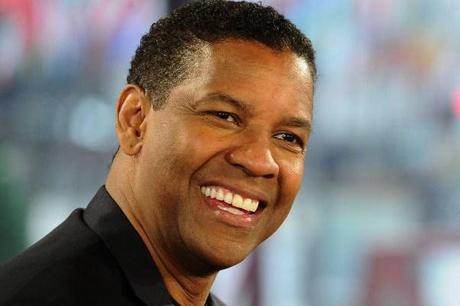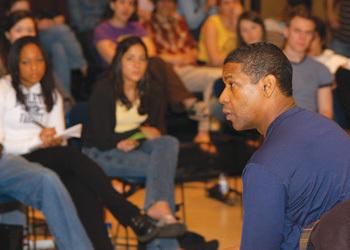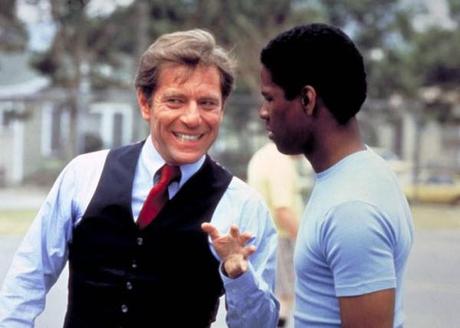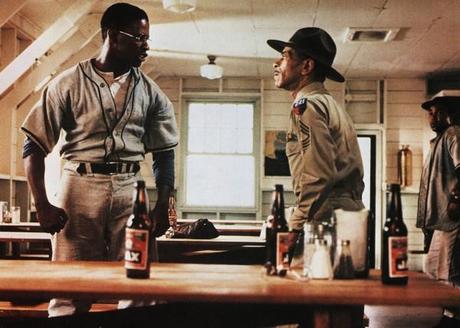The award-winning actor continues to give generously of himself, and not just to movie fans but to his alma mater as well.

Denzel Washington at Fordham (professu.com)
Call me crazy, but I remember Denzel Washington. I seem to recall a shy, unobtrusive African American youth, his six-foot-one-inch frame striding briskly down the corridors of Keating Hall, the main academic building at Rose Hill, the Bronx locality of Fordham University. That would have been in the early 1970s, the year Fordham went co-educational.
It was easy to spot an African American male on campus back then, mainly because there were so few of them around. Still, I don’t believe Denzel and I ever shared classes together, but I can’t be certain of it. Heck, I’ve been wrong about such things before, so why push my luck.
However, there are two things about us I know I’m certain of. For one, we were both born in the same year. To be exact, I’m a middle-of-July baby, while he came into this world five months after I did, on December 28. For another, having grown up with an unusual-sounding first name, I’d be able to recollect someone named Denzel. For that reason, that name has stuck with me. And as far as I know, I’m aware of only one Denzel, and that’s Mr. Washington. Have you met anyone else with that moniker? Well, have you? I didn’t think so.
We were freshmen among a sea of freshmen, unacquainted with, and uninitiated in, modern college life. I myself started as a biology major who later took up history, art history, theology, philosophy, accounting, music, you name it. As for Denzel… well, to hear him tell it, he was undecided too. “[I] meandered from pre-med to political science,” he reminisced recently, “before coming downtown from Rose Hill to try [my] hand at acting.” In fact, he dabbled in journalism prior to branching out into drama, a subject he’s grown to master over time. Oh, and I’m told he played a mean game of basketball.
After taking a semester off, more or less, Denzel came back to Fordham — this time, to the school’s Lincoln Center campus where he majored in theater. It seemed that in the interim he’d been bitten by the acting bug. I wouldn’t be surprised if Denzel had bitten that old bug right back! Sink or swim, that’s how it is with actors whose background encompassed the stage.
He graduated from Fordham in 1977 and went on to appear in the TV series St. Elsewhere. Three decades later, in October 2011, he returned to his alma mater to score yet another triumph, this time by endowing the Denzel Washington Chair in Theater with a lavish $2 million donation. In addition, he made an equally generous outlay of $250,000 to establish the Denzel Washington Endowed Scholarship for up-and-coming undergrads desiring to make theater their life’s vocation. Now that’s what I call a payback!

Denzel at Fordham, Lincoln Center (fordham.edu)
“Show me a successful individual, and I’ll show you someone who has had positive influences in his or her life. The late Bob Stone, my mentor, was a former actor and professor at Fordham University. Bob was one of those influences in my life. He believed in me and gave me something to live up to,” Denzel related. “I wanted to create the Denzel Washington Endowed Scholarship and Chair at Fordham in order to offer the next generation of students [some] positive influences.”
Not only has Denzel demonstrated his gratitude to the school that changed his life’s vocation, he’s positively influenced viewers the world over with his special brand of acting talent, both on the screen and in the theater. On a break last October from promoting his latest film vehicle Flight, Denzel spoke to Fordham theater students, stressing that, “My life is not typical in this profession, but one thing I know I have in common with everybody here is the ability to give back.”
In like manner, I’ve decided to exercise my “ability to give back” by writing this highly-anticipated piece about one of my favorite actors. Not to pay lip service to a fellow alumnus (heaven forbid), but to tell readers how much Denzel Washington has moved people like me with his performances — how far he’s come as an actor and director, and how the unobtrusive, six-foot-one-inch former freshman became one of Hollywood’s most admired and respected leading men.
It’s my way of thanking him for the years of service he’s devoted to his craft. How’s that for a payback?
From Stage to Screen
Denzel Washington started acting in amateur theater productions long before he ever stepped out onto the footlights of Broadway. His opportunities at Fordham, for example, included lead roles in Eugene O’Neill’s The Emperor Jones and Shakespeare’s Othello. He had this to say about American playwright O’Neill: “I didn’t even know who O’Neill was, but to this day [he] remains one of [my] favorite writers. The pain that he suffered, I just related to it. The tears on the page made sense to me.”
A scholarship to San Francisco’s American Conservatory Theatre eventually led to a part in the 1977 made-for-television movie Wilma Purple. In 1981 he made his official big screen debut in the comedy-drama Carbon Copy, which starred George Segal, Susan Saint James, Jack Warden, Paul Winfield, and comic Dick Martin as a pot-smoking attorney.
Denzel co-stars as the long-lost “teenage” son of Jewish businessman Segal, the result of a long-ago love affair with the son’s African American mother. It’s Will Ferrell’s Elf without the Christmas cheer or belly-laughs (or Will Ferrell, for that matter), a “riches to rags” story that, were it not for Denzel’s easygoing charm and winning smile, would sink of its own featherweight.

George Segal & Denzel in Carbon Copy (allmovie.com)
The film’s lackluster attempts at humor, as well as its cringe-inducing stabs at social commentary and what passed for 1980s-style “relevance,” are positively uninspiring. A junior varsity player in real-life, Denzel does get to demonstrate his street “creds” in a father-son pickup game with a roly-poly white kid, who manages to sink a 20-foot jump shot at the actor’s expense. “I happen to be the only father of a black kid who can’t play basketball,” whines Segal afterwards. Yes, the comedy is all on that level. Swoosh!
At this formative stage in his career, Carbon Copy stands out from Denzel’s other run-of-the-mill entries as an intro to moviegoers of his future vision for himself, i.e., that of the self-made common man (black or otherwise) able to stand on his own merits and accomplishments; a self-assured advocate for change from the prevailing status quo, and a doggedly determined nonconformist willing to invest his time and effort toward bringing people around to his way of thinking.
Despite his age (he was 26 at the time) Denzel does a relatively credible job of playing a 17-year-old high-school dropout, one with the heart of an urban street hustler, and the wit and wisdom of a born theorist. His feisty comebacks and smart-ass putdowns seem already part of his later cinematic makeup, even in this early outing.
You’re in the Army Now
Although Denzel was hardly noticed for this, his initial movie appearance, theater patrons raved over his off-Broadway performances as Pfc. “Pete” Peterson in Charles Fuller’s Pulitzer Prize-winning A Soldier’s Play, which premiered on November 20, 1981. The play, a loosely-based adaptation of Herman Melville’s novella Billy Budd, takes place at a U.S. Army base in Louisiana during the waning years of WWII.

Denzel confronts Adolph Caesar in A Soldier’s Story (backtimetv.blogspot.com)
The story centers on the murder of a light-skinned, non-commissioned black sergeant named Vernon Waters (Adolph Caesar), whose deliberately spiteful treatment of the darker-skinned recruits under his command (“He treats you like dogs”) earns the enmity of his unit. A clear case of reverse discrimination within the ranks, the investigating officer assigned to the murder case, Captain Davenport (Charles Brown), concludes that one of Waters’ own men may have been responsible for his death.
In 1984, the play was transferred to the screen under the title A Soldier’s Story. Directed by Norman Jewison (Fiddler on the Roof), with a screenplay by playwright Fuller, original cast members Adolph Caesar, Denzel Washington, and Larry B. Riley as Pvt. C.J. Memphis, grace this production as well, along with the young David Alan Grier as Corporal Cobb.
“Hey, what kinda colored man are you?” Peterson inquires of Sgt. Waters. “I’m a soldier, Peterson,” Waters replies, with a contemptuous sneer in his voice. “And the kind of colored man that don’t like lazy shiftless Negroes.” The sergeant is filled with as much rage and self-loathing as he has hatred for his troops.
With that, Waters goads Peterson into a one-sided fight where Peterson gets beaten to a pulp. Later, Waters turns in one of the recruits in order to get another stripe on his uniform. “He can’t look good unless he’s standin’ on you! Only reason they let him in the army is because he’ll do anything they tell him to,” complains Peterson. Trained to fight in a segregated unit, for the segregated armed forces of the segregated United States of America — and in the Jim Crow era of the Deep South, at that — Peterson reasons it was bad enough for them to put up with racism from white units. Why should they have to take it from one of their own?
“I seen this kinda fool before,” he continues. “Yeah, somebody’s gonna kill him one of these days.” Taking matters into his own hands, Peterson is forced to face the consequences of his actions when he confronts Captain Davenport (Howard E. Rollins Jr.) in the film’s climax. All the players are good in this powerful drama, but an indignant, always dignified Denzel — and especially Caesar, who was nominated for a Best Supporting Actor Oscar® for his reenactment of a modern-day Claggart — ran away with the acting honors.
Caesar suffered a fatal heart attack only two short years after the movie’s release. On a side note, jazz pianist Herbie Hancock wrote the period-flavored music score. Denzel’s easy bonding with his band of brothers, so to speak, and complete identification as “one of the boys” would serve him well in his next war movie, Glory. Proud and defiant, that’s Denzel.
Doctor in the House
If Caesar’s heart condition had been fictional, he might have called on Dr. Phillip Chandler, from the successful NBC-TV medical drama St. Elsewhere, for immediate assistance… or maybe not.
The show, an MTM Enterprises production very much in concept and format of its predecessor, the long-running police drama Hill Street Blues (another MTM production), was a so-called “realistic” series with overlapping, continuously running story lines, some of which (pardon the expression) “bled” into other episodes of the same or later season.

Cast of St. Elsewhere (NBC TV / The Kobal Collection)
St. Elsewhere, which referred to the less than first-rate, fictional Boston hospital St. Eligius, aired from 1982 to 1988. It was the winner of numerous Emmy Awards, garnering significant praise from critics and public alike. On the show, Denzel played do-gooder Dr. Chandler for the entirety of its six-year run. That’s stick-to-it-tive-ness! He left both the series and St. Eligius in the next to last episode, wherein he also quit the medical profession. If you see D.W.’s 2002 picture John Q, you’ll understand why… (“Do something!”)
Having learned the value of hard work and the benefits of acting with an ensemble in his early college and summer-stock days, Denzel fit in smoothly with the rest of the large cast, which included such veterans as Ed Flanders, David Birney, Norman Lloyd, William Daniels, France Nuyen, and Ronny Cox, along with (relative) newcomers Ed Begley Jr., Stephen Furst, Bruce Greenwood, Mark Harmon, Howie Mandel, David Morse, Alfre Woodard, Cindy Pickett, Christina Pickles, Jennifer Savidge, and Nancy Stafford.
Hill Street Blues (Mike Post, Larry Carlton) and Taxi (Bob James) both used established jazz musicians to write their main themes. St. Elsewhere was no exception: its opening and closing themes were composed by Dave Grusin, who was owner and co-founder with Larry Rosen of GRP Records, a strictly smooth-jazz label. Grusin also wrote the scores for On Golden Pond, Tootsie, Tequila Sunrise, The Fabulous Baker Boys, Havana, and The Firm.
Music would continue to play a conspicuous part in many of Denzel’s future film assignments, to include the aforementioned Glory (score by James Horner), Mo’ Better Blues (Bill Lee, Spike Lee’s father), his first of four collaborations with director Lee, and director-writer Carl Franklin’s atmospheric Devil in a Blue Dress (music by Elmer Bernstein), which takes place in New Orleans and leans heavily on the blues and jazz influences.
(End of Part One – To be continued…)
Copyright © 2013 by Josmar F. Lopes

